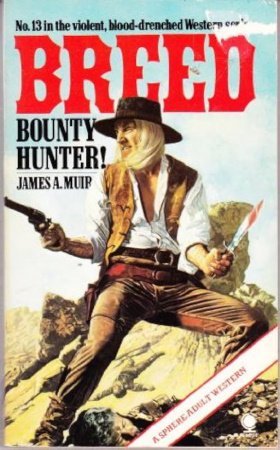Azul dumped the deer on the ground and built the fire to usable size. Then he gutted the pronghorn and skinned off sufficient meat to carry two men through two days.
‘What you doing here?’ he asked. ‘Why’d you come out here?’
‘I heard about the Old West,’ said Backenhauser. ‘I wanted to paint it. I don’t know much about hunting animals or skinning them, but I’m a good painter.’
‘I’m not arguing that,’ said Azul. ‘But how’d you land up in New Mexico?’
‘Accident,’ said Backenhauser. ‘More or less. I got a boat over to New York, but that didn’t seem like the real West, so I got passage to St Louis, and after that I came on to San Jacinto. Folks told me that was where I’d find real Indians and real cowboys. Which are you?’
‘Neither,’ grunted Azul. ‘I’m not a cowboy, not even a real Indian.’
‘What are you then?’ asked Backenhauser. ‘You look white to me.’
‘You don’t understand much, do you?’ said Azul. ‘My mother was Chiricahua Apache, and my father was white. That makes me a half-breed.’
‘Does that matter?’ asked Backenhauser. ‘Why should it?’
‘Where’d you come from?’ Azul said.
‘England,’ replied the artist. ‘From the northern part.’
‘I guess it must be different there,’ said Azul. ‘Maybe they don’t have half-breeds there.’
‘We have mulattoes,’ said Backenhauser. ‘And Lascars. I’ve painted some of them.’
‘Where?’ Azul asked. ‘In their homes?’
‘Never found out where they lived,’ said the artist. ‘I just painted them around the docks.’
‘Docks?’ The word was strange to the half-breed. ‘What are docks?’
‘Places where ships come in.’ Backenhauser frowned, shrugging. ‘Lots of people hang around docks. All kinds. All colors.’
‘Where do they live?’ Azul repeated. ‘Don’t you know?’
‘I guess not,’ said Backenhauser. ‘I guess I never thought to ask.’
‘But you came here and tried to paint the people who lived here.’ Azul watched the meat crisping on the impromptu spit. ‘Do you know more about them?’
‘Not much, it seems,’ chuckled Backenhauser. ‘I never thought those cowboys would get so angry.’
‘Why do it, then?’ Azul demanded. ‘Why come here when you don’t even understand your own country?’
Backenhauser shrugged, staring hard at the cold face of the half-breed, feeling the tentative starting of fear.
‘I don’t know. All the painting in England’s been done. I wanted to portray something new, so when I heard about the New Frontier, I came West. I thought I could do something new.’
Azul stripped meat from the roasting haunch and passed chunks to the artist. Backenhauser took them, eating greedily. The half-breed cut his own portion and ate slowly, chewing each mouthful so as to take all the goodness out, savoring each mouthful.
‘I guess you don’t think much of me?’
Backenhauser wiped a hand over his face and stroked through his mustache for forgotten fragments.
‘Not much,’ Azul agreed. ‘But I guess I’m stuck with you.’
‘How’s that?’ Backenhauser shrugged. ‘You could leave me now. Like you said: We’re squared. You saved my life; I helped you.’
Azul paused, sucking marrow from a deer bone. The same kind of imponderable question that had been so easy to resolve when it was simply a question of pointed guns proved harder to answer when it became a question of words.
‘You said we were square,’ said Backenhauser. ‘You saved me, I helped you.’
‘You couldn’t live out here,’ said Azul. ‘Could you?’
‘I got a horse,’ said the artist. ‘I guess I can find the next town.’
‘You can’t stay alive that long,’ said the half-breed. ‘You know where it is?’
Backenhauser shook his head.
‘You got no food with you,’ said Azul. ‘You know how to hunt?’
The gray derby shook again.
‘And you can’t even ride right.’
The derby nodded.
‘So if I leave you out here, you’re gonna die,’ said Azul.

























